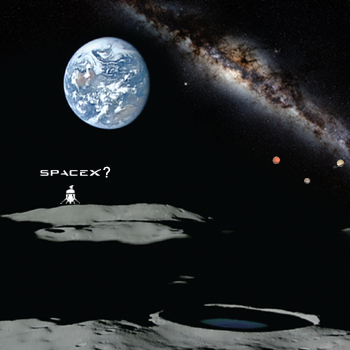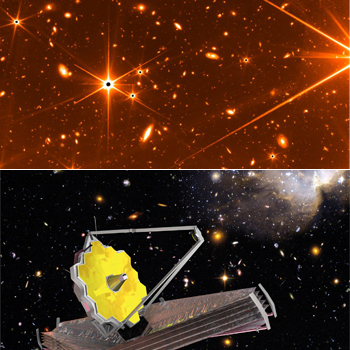Who Will Claim Malapert Mountain, Most Valuable Point Near the Moon South Pole?
International Lunar Observatory Association ILO-1 flagship mission, destined for Malapert ‘Point E’ since its conception in 2006, continues to seek collaboration, enterprise, customers, partners in international space agencies, Blue Origin, SpaceX, and other pioneers. Mission and site characterization studies funded by ILOA and developed by Canadensys Aerospace Corp. (2015-current), Moon Express (2010-2019), MDA (2008-2010) and SpaceDev (2003-2008) conclude Malapert massif is a most valuable strategic, infrastructure platform. 5-kilometer Malapert mountain at 86°S towers above the Solar System’s largest impact crater, 2,500-km diameter South Pole-Aitken Basin within sight of Shackleton Rim. Malapert offers strategic advantages for lunar base buildout including near-continuous line-of-sight for Earth observations and communications, ‘Peak Of Eternal Light’ illuminated areas for ~300 Earth days, more moderate thermal environment, access to permanently shadowed regions / small cold traps, shielded far-side flank for radio astronomy, and ISRU resources to support fuel / life systems / manufacturing. This high ground is a unique location for commerce, Galaxy and local environment observations, science, education and possible contingency / emergency support point for Moon bases or satellite relay communication fail-safes. Artemis human landings NLT 2025-26 are being planned for a location within 6° of Moon South Pole while Russia-China International Lunar Research Station, Moon Village, India Chandrayaan, National Space Agencies, and commercial groups target robotic and human surface landings with similar mission requirements: sunlight availability, likelihood of finding water, navigable area and elevation. (Image Credits: JAXA, NHK, NASA, ESO, SpaceX) |
MONDAY☆ Jul 11 — ISS, ~405-km LEO: Expedition 67 seven-member crew working with grip experiments, new 3D printer, food audits, waste disposal via Nanoracks Airlock; Artemyev and Cristoforetti planning for Russia EVA next week. ☆ Jul 11 — Tiangong Space Station, ~370-km LEO: Shenzhou 14 crew Chen Dong, Liu Yang, Cai Xuzhe preparing for upcoming work with Wentian module launch scheduled in 12 days. Highlights… o NewSpace: 2024/5 OneWeb deal raises total contracted launch services to US$1.2B for Relativity Space of Long Beach CA; Virgin Galactic striving for commercial passenger spaceflight Q1 2023, hires Boeing subsidiary Aurora Flight Sciences to build 2 motherships expected to fly NET 2025. ☆ Solar System: ESA Mars Express orbiter being prepared for operating system upgrade; Advanced Space and Terran Orbital restore communication with CAPSTONE, plan next orbital correction en route to Moon orbit. ☆ Galaxy: University of Portsmouth study posits early universe quasars are result of turbulent gas / dark matter interactions accelerating star / black hole cycle; S4716, fastest known star, is orbiting Sgr A* at 29,000,000 kph, observed by 5 telescopes including Keck. o Global: First China commercial spaceport in Wenchang, Hainan Island (19° N) under construction; Data collected from ESA lunar analog ARCHES to be used to set perimeters for rovers controlled from Gateway, haptic feedback; 72 launches during first half 2022 puts world on track to surpass 2021 record of 135. ● USA: SpaceX closer to Starship orbital test flight with 6 Raptor engines fitted to SN24, 33 on Booster 7, launchpad rollout; At least 2 BE-4 engines being assembled at Blue Origin factory in Kent WA, next New Shepard flight to include Portugal citizen, Florida restaurateur. ● Hawai’i: UH Mānoa partnering with HONUA Scholars to offer lunar exploration analog program for Native Hawaiian students; PISCES launches new website; Windward Community College Imaginarium through Aug 27 includes program on stargazing & Astronaut points of view. |
 |
● = Terrestrial events, and…
o = International terrestrial events in local time. ★ = Space events, and… ☆ = International space / astro events in Hawaii Standard Time unless noted. Add 10 hours to obtain UT (‘Universal Time’). |
Weekly Planet Watch – Morning Planets: Venus (ENE), Mars (ESE), Jupiter (SE), Saturn (S), Uranus (E), Neptune (SE).
James Webb Space Telescope Images Set to Revolutionize Understanding of Cosmos July 12
|
● Jul 11 — LPI, USRA, NASA, Online / Houston TX: Lunar Surface Science Workshop 17: Defining a Coordinated Lunar Resource Evaluation Campaign. ● Jul 11 — NASA SSERVI, University of Colorado – Boulder, Online: LunGradCon 2022 Day One, Online Event. ● Jul 11-12 — America’s Future Series, Online: 2022 Space Innovation Summit; featuring Peter Beck, Richard Branson, Tory Bruno, Robert Lightfoot, Moriba Jah, more; 08:30-16:00 CDT. o Jul 11-15 — Royal Astronomical Society, University of Warwick, Warwick, United Kingdom: UK National Astronomy Meeting 2022. o Jul 11-15 — Space Telescope Science Institute, Stockholm, Sweden: Science with the Hubble and James Webb Space Telescopes VI: Entering a Golden Age for UV-Optical-IR Space Astronomy. ● Jul 11-29 — National Space Society, Blue Origin Club for the Future, Brownsville TX: Expanding Frontiers’ Space Entrepreneur Summer Academy (SESA); education program for where students interact with scientists and astropreneurs. Continued From… ★ Jun 28 – Nov 13 — CAPSTONE, Near-Rectilinear Halo Orbit Trajectory: Cislunar Autonomous Positioning System Technology Operations and Navigation Experiment heading to operating position at NRHO / cislunar space. o Jul 5 – Aug 2 — KARI, Incheon International Airport, S Korea: South Korea lunar orbiter ‘Danuri’ on its way to Cape Canaveral SFS for integration and testing prior to scheduled August 5 launch on Falcon 9. TUESDAY☆ Jul 12 — NASA, Equatorial Launch Australia, Launch Black Brant 9 / Dual-channel Extreme Ultraviolet Continuum Experiment (DEUCE), Arnhem Space Center, Yolngu land, Australia: Magellan Aerospace sounding rocket launching astrophysics mission to study extreme UV spectrum, led by Univ of Colorado Boulder. ☆ Jul 12 — James Webb Space Telescope, Sun-Earth Lagrange point (L2): Release of JWST first full-color images and spectroscopic data scheduled for today. |
● Jul 12-14 — Johns Hopkins University Applied Physics Laboratory, Laurel MD: Workshop: In Situ Exploration of the Giant Planets II.
☆ Jul 12 — Moon: At perigee, distance 357,304 km, 23:09.
☆ Jul 12 — Aten Asteroid 2015 OQ21: Near-Earth Flyby (0.047 AU)
WEDNESDAY
☆ Jul 13 — International Space Station, ~405-km LEO: ISS Expedition 67 in-flight interview with WHP-TV, Harrisburg PA and NASA Astronaut Bob Hines on the Space Station, starts 13:00 EDT, live coverage available.
☆ Jul 13 — Arianespace, Launch Vega C / LARES 2, SLC, Kourou, French Guiana: Inaugural flight of Vega C rocket to launch Italian Space Agency (ASI) LARES 2 satellite – covered in laser mirrors to enable precise tracking from the ground, enabling research into geoodynamics and general relativity.
● Jul 13 — NASA, Solar System Exploration Research Virtual Institute, Online: SSERVI Virtual Networking and Mentoring Event.
● Jul 13 — Human Exploration and Operations Committee of NASA Advisory Council, Washington DC and Online: Meeting of the Human Exploration and Operations Committee.
☆ Jul 13 — Moon: Full / Buck / Super Moon, 08:37.
☆ Jul 13 — Aten Asteroid 2018 RL4: Near-Earth Flyby (0.08423 AU)
THURSDAY
★ NET Jul 14 — SpaceX, Launch Falcon 9 / Dragon CRS-25, LC-39A, Kennedy Space Center FL: Dragon 2 spacecraft to launch on its 5th cargo resupply mission / 25th mission overall for SpaceX under Commercial Resupply Services contract.
☆ Jul 14 — Comet C/2017 K2 (PANSTARRS): Closest Approach To Earth (1.808 AU)
FRIDAY
☆ Jul 15 — Moon: 3.8° SE of Saturn, 13:00.
SATURDAY
● Jul 16 — NASA, 53rd Observation of Apollo 11 Launch, Nationwide USA / Global: The launch of the Apollo 11 mission / first humans to the Moon is celebrated today while NASA SLS mega Moon rocket is being prepared for inaugural launch NET August 23 – September 6.
o Jul 16 — International Academy of Astronautics, Athens, Greece: IAA Academy Day Athens.
o Jul 16-24 — United Nations Committee on Space Research and Associated Events, Athens, Greece: 44th Scientific Assembly of the Committee on Space Research and Associated Events (COSPAR 2022).
☆ Jul 16 — Mercury: 5.2° S of Pollux, 04:00; at superior conjunction with Sun, 09:00.
☆ Jul 16 — Amor Asteroid 2022 LR1: Near-Earth Flyby (0.023 AU)
SUNDAY
★ Jul 17 — Acceleration, Reconnection, Turbulence and Electrodynamics of the Moon’s Interaction with the Sun (ARTEMIS) P2, Moon Orbit: Craft reaches 11 full years / enters 12th year in Moon orbit today; originally launched with constellation of 5 satellites in 2007 to study Earth magnetosphere, NASA craft collecting data on Moon interaction with Sun; reached Moon 2011.
★ Jul 17 — Firefly Aerospace, Launch Firefly-Alpha Test, Vandenberg SFB CA SLC 2W: Firefly Aerospace second demonstration flight ‘To The Black’ mission with multiple unspecified small satellites.
☆ Jul 17 — Amor Asteroid 2022 KY4: Near-Earth Flyby (0.040 AU)
☆ Jul 17 — Aten Asteroid 2021 OT: Near-Earth Flyby (0.042 AU)
☆ Jul 17 — Apollo Asteroid 2016 NO56: Near-Earth Flyby (0.095 AU)

